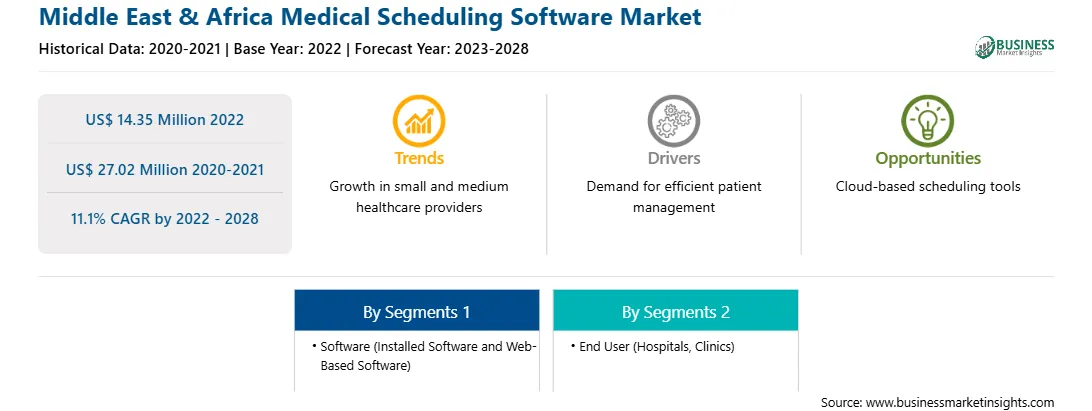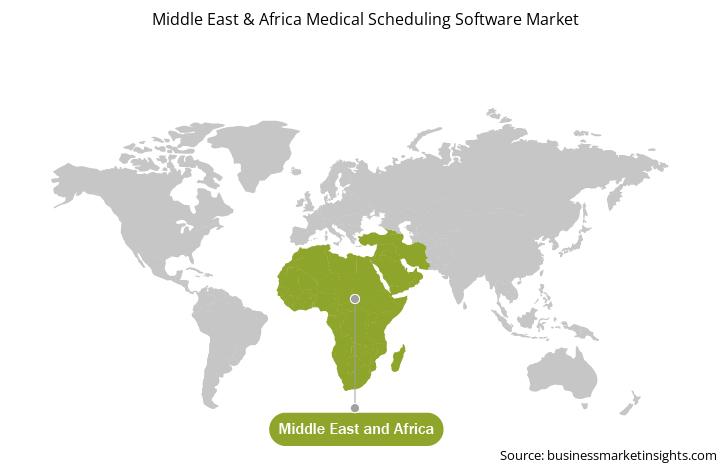Middle East & Africa Medical Scheduling Software Market
No. of Pages: 81 | Report Code: BMIRE00029013 | Category: Technology, Media and Telecommunications
No. of Pages: 81 | Report Code: BMIRE00029013 | Category: Technology, Media and Telecommunications
The emergence of the Internet of Things (IoT) has propelled the development of various health practices aimed at improving population health. Many services and applications of IoT in healthcare—eHealth, mobile health (mHealth), ambient assisted living, semantic devices, wearable devices and smartphones, and community-based healthcare—have been examined in several recent studies. These services have been extensively informative and can be used for a variety of purposes across single condition and cluster condition management, including allowing healthcare professionals to track and monitor patient progress remotely, improving self-management of chronic conditions, assisting in the early detection of abnormalities, and accelerating symptom identification and clinical diagnoses. Further, IoT-powered apps have the potential to make better use of healthcare resources while providing high-quality, low-cost medical treatment.
Further artificial intelligence (AI) has boosted the availability of point-of-care health information; for example, chatbots (also known as AI physicians) can provide lifestyle and medical advice. Woebot, Your. Md, Babylon, and HealthTap are among other examples of well-known AI bots that provide immediate recommendations to patients, based on details/symptoms entered by them.
Opportunities for IoT innovation in the healthcare industry are continuously emerging and evolving. Medical facilities have special challenges, and vendors of IoT are developing new approaches to address those challenges.
The Middle East & Africa medical scheduling software market has been segmented into the UAE, Saudi Arabia, South Africa, and the Rest of Middle East & Africa. Saudi Arabia is expected to account for the largest market share and is expected to develop moderately in the Middle East & Africa. The market growth is attributed to various factors, such as significant development in healthcare facilities, overcrowding at health care centers, and the geographic expansion of market players. Moreover, the rising prevalence and incidences of chronic disorders, improving healthcare offering as well as the government initiatives undertaken by countries such as UAE and Saudi Arabia are further expected to boost the medical scheduling software market growth over the forecast period.
Strategic insights for the Middle East & Africa Medical Scheduling Software provides data-driven analysis of the industry landscape, including current trends, key players, and regional nuances. These insights offer actionable recommendations, enabling readers to differentiate themselves from competitors by identifying untapped segments or developing unique value propositions. Leveraging data analytics, these insights help industry players anticipate the market shifts, whether investors, manufacturers, or other stakeholders. A future-oriented perspective is essential, helping stakeholders anticipate market shifts and position themselves for long-term success in this dynamic region. Ultimately, effective strategic insights empower readers to make informed decisions that drive profitability and achieve their business objectives within the market. The geographic scope of the Middle East & Africa Medical Scheduling Software refers to the specific areas in which a business operates and competes. Understanding local distinctions, such as diverse consumer preferences (e.g., demand for specific plug types or battery backup durations), varying economic conditions, and regulatory environments, is crucial for tailoring strategies to specific markets. Businesses can expand their reach by identifying underserved areas or adapting their offerings to meet local demands. A clear market focus allows for more effective resource allocation, targeted marketing campaigns, and better positioning against local competitors, ultimately driving growth in those targeted areas.Middle East & Africa Medical Scheduling Software Strategic Insights

Middle East & Africa Medical Scheduling Software Report Scope
Report Attribute
Details
Market size in 2022
US$ 14.35 Million
Market Size by 2028
US$ 27.02 Million
Global CAGR (2022 - 2028)
11.1%
Historical Data
2020-2021
Forecast period
2023-2028
Segments Covered
By Software
By End User
Regions and Countries Covered
Middle East and Africa
Market leaders and key company profiles
Middle East & Africa Medical Scheduling Software Regional Insights

Middle East & Africa Medical Scheduling Software Market Segmentation
The Middle East & Africa medical scheduling software market is segmented into software, end user, and country.
Based on software, the Middle East & Africa medical scheduling software market is segmented into web-based software and installed software. The web-based software held a larger Middle East & Africa medical scheduling software market share in 2022.
Based on end user, the Middle East & Africa medical scheduling software market is segmented into hospitals, clinics, and other end users. The hospitals segment held the largest Middle East & Africa medical scheduling software market share in 2022.
Based on country, the Middle East & Africa medical scheduling software market is segmented into Saudi Arabia, South Africa, the UAE, and the Rest of Middle East & Africa. Saudi Arabia dominated the Middle East & Africa medical scheduling software market share in 2022.
Cloudpital Pvt Ltd, Kaizen Star Technologies LLC, Q-nomy Inc, and WellSky are some of the leading companies operating in the Middle East & Africa medical scheduling software market in the region.
The Middle East & Africa Medical Scheduling Software Market is valued at US$ 14.35 Million in 2022, it is projected to reach US$ 27.02 Million by 2028.
As per our report Middle East & Africa Medical Scheduling Software Market, the market size is valued at US$ 14.35 Million in 2022, projecting it to reach US$ 27.02 Million by 2028. This translates to a CAGR of approximately 11.1% during the forecast period.
The Middle East & Africa Medical Scheduling Software Market report typically cover these key segments-
The historic period, base year, and forecast period can vary slightly depending on the specific market research report. However, for the Middle East & Africa Medical Scheduling Software Market report:
The Middle East & Africa Medical Scheduling Software Market is populated by several key players, each contributing to its growth and innovation. Some of the major players include:
The Middle East & Africa Medical Scheduling Software Market report is valuable for diverse stakeholders, including:
Essentially, anyone involved in or considering involvement in the Middle East & Africa Medical Scheduling Software Market value chain can benefit from the information contained in a comprehensive market report.